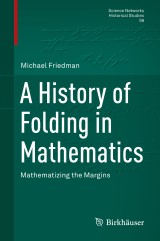Details

A History of Folding in Mathematics
Mathematizing the MarginsScience Networks. Historical Studies, Band 59
|
223,63 € |
|
| Verlag: | Birkhäuser |
| Format: | |
| Veröffentl.: | 25.05.2018 |
| ISBN/EAN: | 9783319724874 |
| Sprache: | englisch |
Dieses eBook enthält ein Wasserzeichen.
Beschreibungen
<p></p><p>While it is well known that the Delian problems are impossible to solve with a straightedge and compass – for example, it is impossible to construct a segment whose length is cube root of 2 with these instruments – the discovery of the Italian mathematician Margherita Beloch Piazzolla in 1934 that one can in fact construct a segment of length cube root of 2 with a single paper fold was completely ignored (till the end of the 1980s). This comes as no surprise, since with few exceptions paper folding was seldom considered as a mathematical practice, let alone as a mathematical procedure of inference or proof that could prompt novel mathematical discoveries. A few questions immediately arise: Why did paper folding become a non-instrument? What caused the marginalisation of this technique? And how was the mathematical knowledge, which was nevertheless transmitted and prompted by paper folding, later treated and conceptualised?</p>
<p>Aiming to answer these questions, this volume provides, for the first time, an extensive historical study on the history of folding in mathematics, spanning from the 16th century to the 20th century, and offers a general study on the ways mathematical knowledge is marginalised, disappears, is ignored or becomes obsolete.</p>
In doing so, it makes a valuable contribution to the field of history and philosophy of science, particularly the history and philosophy of mathematics and is highly recommended for anyone interested in these topics.<p></p><p></p>
<p>Aiming to answer these questions, this volume provides, for the first time, an extensive historical study on the history of folding in mathematics, spanning from the 16th century to the 20th century, and offers a general study on the ways mathematical knowledge is marginalised, disappears, is ignored or becomes obsolete.</p>
In doing so, it makes a valuable contribution to the field of history and philosophy of science, particularly the history and philosophy of mathematics and is highly recommended for anyone interested in these topics.<p></p><p></p>
<p>Introduction.- From the 16<sup>th</sup> Century Onwards: Folding Polyhedra. New Epistemological Horizons?.- Prolog to the 19<sup>th</sup> Century: Accepting Folding as a Method of Inference.- The 19<sup>th</sup> Century – What Can and Cannot be (Re)presented: On Models and Kindergartens.- Towards the Axiomatization, Operationalization and Algebraization of the Fold.- The Axiomatization(s) of the Fold.- Appendix I: Margherita Beloch Piazzolla: “Alcune applicazioni del metodo del ripiegamento della carta di Sundara Row”.- Appendix II: Deleuze, Leibniz and the Unmathematical Fold.- Bibliography.- List of Figures.</p><p></p><p></p><p></p>
<p></p><p>While it is well known that the Delian problems are impossible to solve with a straightedge and compass – for example, it is impossible to construct a segment whose length is the cube root of 2 with these instruments – the discovery of the Italian mathematician Margherita Beloch Piazzolla in 1934 that one can in fact construct a segment of length the cube root of 2 with a single paper fold was completely ignored (till the end of the 1980s). This comes as no surprise, since with few exceptions paper folding was seldom considered as a mathematical practice, let alone as a mathematical procedure of inference or proof that could prompt novel mathematical discoveries. A few questions immediately arise: Why did paper folding become a non-instrument? What caused the marginalisation of this technique? And how was the mathematical knowledge, which was nevertheless transmitted and prompted by paper folding, later treated and conceptualised?</p>
<p>Aiming to answerthese questions, this volume provides, for the first time, an extensive historical study on the history of folding in mathematics, spanning from the 16th century to the 20th century, and offers a general study on the ways mathematical knowledge is marginalised, disappears, is ignored or becomes obsolete.</p>
In doing so, it makes a valuable contribution to the field of history and philosophy of science, particularly the history and philosophy of mathematics and is highly recommended for anyone interested in these topics.<p></p><p></p>
<p>Aiming to answerthese questions, this volume provides, for the first time, an extensive historical study on the history of folding in mathematics, spanning from the 16th century to the 20th century, and offers a general study on the ways mathematical knowledge is marginalised, disappears, is ignored or becomes obsolete.</p>
In doing so, it makes a valuable contribution to the field of history and philosophy of science, particularly the history and philosophy of mathematics and is highly recommended for anyone interested in these topics.<p></p><p></p>
Provides a lucid exposition on the history of the mathematical concept of folding starting from the 16th century Researches the various ways in which mathematical knowledge was and is marginalized Surveys clearly the ways in which mathematical research and mathematical inference procedures were changing during the centuries

















